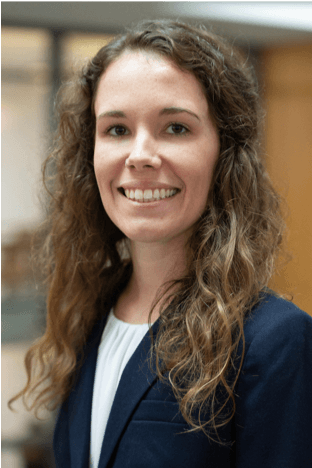 Please help us welcome new Assistant Professor of Biostatistics, Dr. Rachel Nethery, to the Department! Learn more about her early years in Kentucky, her time as a postdoc in the Department, and her goal of developing methods to better evaluate the health impacts of environmental regulatory policy:
Please help us welcome new Assistant Professor of Biostatistics, Dr. Rachel Nethery, to the Department! Learn more about her early years in Kentucky, her time as a postdoc in the Department, and her goal of developing methods to better evaluate the health impacts of environmental regulatory policy:
What led to your decision to join Harvard Biostats?
I was fortunate enough to join the department two years ago as a postdoc with Francesca Dominici, and during this time I have developed a strong connection to and appreciation for this department. The faculty, staff, and students in the department are not only brilliant and passionate about their work but also have great attitudes and really make day-to-day life in the department pleasant and fun. Both within the department and across the university, Harvard offers unparalleled opportunities for collaboration with researchers doing groundbreaking work in all areas of health and medicine, making it one of the most exciting places in the world to work. Because I don’t want to mislead you into thinking that all of my ideals are lofty, I should acknowledge that my love for the department is not independent of the high frequency of pizza parties (and other social events with food) that occur here. Having formed this connection to the Harvard Biostats environment as a postdoc, I was delighted and humbled to receive the opportunity to join this department as faculty, and I look forward to continuing to work (and chat by the coffee machine and enjoy leftovers in the kitchen) with you all.
Where did you grow up? Can you point to something in your life that may have influenced your decision to study biostatistics?
I grew up on a farm in rural Kentucky. Although few people there had any post-secondary business or mathematical training, most of the farmers managed their own finances and emphasized to me the importance of quantitative skills. My fantastic high school calculus and physics teachers, Mrs. Parritt and Mr. Cox, get credit for my inspiration to pursue a quantitative career. Their enthusiasm about math was contagious, and their classes got me excited about using math to solve real world problems. During college, a professor (Mahlet Tadesse, a Harvard Biostats alum) encouraged me to attend SIBS, a summer biostatistics program offered at several universities across the US. I went to SIBS at Emory University, where I was introduced to spatial modeling by Lance Waller and to infectious disease modeling by Michael Haber. The incredible experience I had there motivated me to pursue a graduate degree in Biostatistics.
What was your previous educational and work experience before joining the Department?
Fun fact, my first “real” job was as a cashier at Walmart (later employment included: server at a local tex-mex restaurant, clothes-folder at a gift shop warehouse, and the person who makes those annoying phone calls asking you to donate to your university). Moving on to more relevant experiences, I went to undergrad at Georgetown University, majoring in math and political science. Afterwards, I went directly into the Biostatistics PhD program at University of North Carolina at Chapel Hill. I completed my PhD there in 2017, and then came to Harvard to do a postdoc with Francesca Dominici.
What do you enjoy most about your job so far and what research directions are you planning to pursue?
Hands down the best part of my current job is the incredible people that I get to work with in Francesca Dominici’s group. During my postdoc I have primarily worked on causal inference methods for environmental health. Because environmental health studies are observational, drawing causal conclusions from them typically requires strong assumptions. Yet, in order for our science to inform environmental regulatory policy or to help bring justice to those impacted by pollution/contamination, it is critical that our results rely on as few untestable assumptions as possible. My research is focused on developing methods to assess and relax those assumptions across a variety of study types and research questions. I enjoy working on this topic due to its potential for direct policy and social impact. Moving forward, I hope to develop better methods to investigate relationships between disease clusters and contaminant exposures and to evaluate the health impacts of environmental regulatory policy.
What do you enjoy outside of work?
I spend much of my free time traveling to visit family and friends in the southeast. When I am in Boston, I enjoy exploring the city and the surrounding areas and trying out new restaurants. I love bluegrass/folk/Americana music, and I try to go to live shows regularly. I also enjoy participating in politics, knitting, riding horses, and playing card games. (“I enjoy watching Netflix” just goes without saying at this point, right?)



